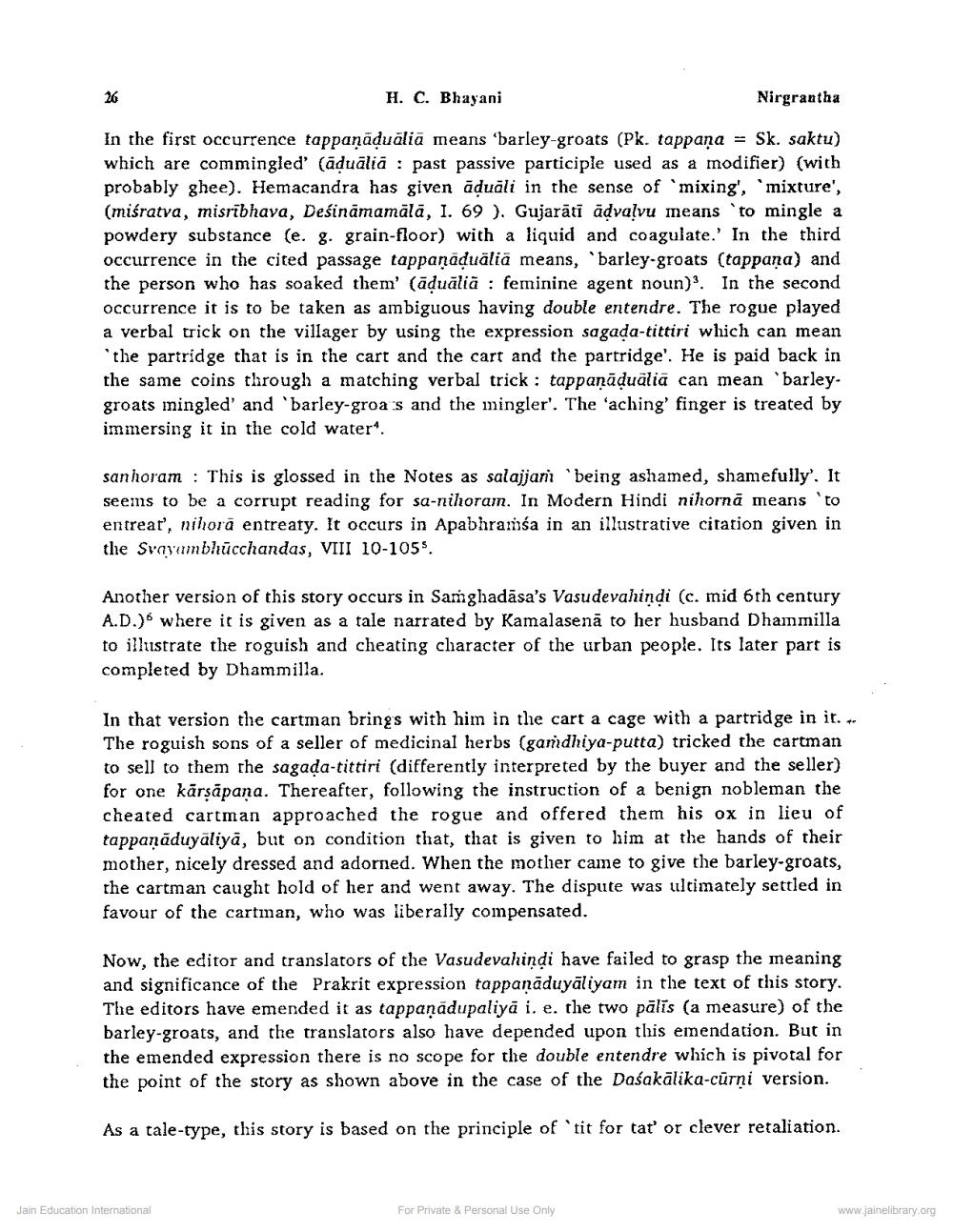Book Title: Notes on Some Prakrit Words Author(s): H C Bhayani Publisher: Z_Nirgrantha_1_022701.pdf and Nirgrantha_2_022702.pdf and Nirgrantha_3_022703.pdf View full book textPage 2
________________ H. C. Bhayani In the first occurrence tappaṇāḍuāliā means 'barley-groats (Pk. tappaṇa = Sk. saktu) which are commingled' (āduäliä: past passive participle used as a modifier) (with probably ghee). Hemacandra has given äḍuäli in the sense of mixing', 'mixture', (miśratva, misribhava, Desināmamālā, 1. 69 ). Gujarāti āḍvalvu means to mingle a powdery substance (e. g. grain-floor) with a liquid and coagulate.' In the third occurrence in the cited passage tappaṇāḍuällä means, barley-groats (tappana) and the person who has soaked them' (āḍuāliã feminine agent noun)3. In the second occurrence it is to be taken as ambiguous having double entendre. The rogue played a verbal trick on the villager by using the expression sagada-tittiri which can mean 'the partridge that is in the cart and the cart and the partridge'. He is paid back in the same coins through a matching verbal trick: tappaṇāḍuäliä can mean 'barleygroats mingled' and 'barley-groas and the mingler'. The 'aching' finger is treated by immersing it in the cold water". 26 sanhoram This is glossed in the Notes as salajjar 'being ashamed, shamefully'. It seems to be a corrupt reading for sa-nihoram. In Modern Hindi nihorna means 'to entreat', nihora entreaty. It occurs in Apabhramsa in an illustrative citation given in the Svayambhucchandas, VIII 10-1055. Nirgrantha Another version of this story occurs in Samghadasa's Vasudevahindi (c. mid 6th century A.D.) where it is given as a tale narrated by Kamalasenā to her husband Dhammilla to illustrate the roguish and cheating character of the urban people. Its later part is completed by Dhammilla. In that version the cartman brings with him in the cart a cage with a partridge in it... The roguish sons of a seller of medicinal herbs (gamdhiya-putta) tricked the cartman to sell to them the sagada-tittiri (differently interpreted by the buyer and the seller). for one kärsapana. Thereafter, following the instruction of a benign nobleman the cheated cartman approached the rogue and offered them his ox in lieu of tappaṇāduyaliyä, but on condition that, that is given to him at the hands of their mother, nicely dressed and adorned. When the mother came to give the barley-groats, the cartman caught hold of her and went away. The dispute was ultimately settled in favour of the cartman, who was liberally compensated. Now, the editor and translators of the Vasudevahindi have failed to grasp the meaning and significance of the Prakrit expression tappaṇāduyaliyam in the text of this story. The editors have emended it as tappaṇadupaliya i. e. the two pālīs (a measure) of the barley-groats, and the translators also have depended upon this emendation. But in the emended expression there is no scope for the double entendre which is pivotal for the point of the story as shown above in the case of the Daśakalika-curṇi version. As a tale-type, this story is based on the principle of 'tit for tat' or clever retaliation. Jain Education International For Private & Personal Use Only www.jainelibrary.orgPage Navigation
1 2 3 4 5 6 7 8 9 10 11 12 13 14
